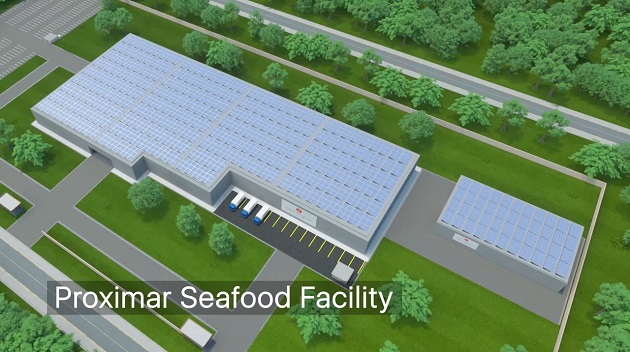
News
Industry update
Japan’s Marubeni to start selling Proximar RAS salmon in 2024
June 23, 2022 By Nestor Arellano
 Artists
's conception of Proximar Seafood's facility (Image from AquaMaof)
Artists
's conception of Proximar Seafood's facility (Image from AquaMaof) Marubeni Corp., aims to begin providing to Japanese consumers, Atlantic salmon grown in a recirculating aquaculture system (RAS) by 2024.
Earlier this year, the Tokyo-based conglomerate has signed an agreement with Norway’s Proximar Seafood that will allow Marubeni to exclusively distribute in Japan fish grown in Proximar’s RAS facility at the foot of Mount Fuji, in Oyama.
The agreement covers sales of all volumes produced by Proximar for the Japanese market and has an initial term of 10 years. Both parties will be actively involved in the marketing efforts, with the aim to build a strong premium sustainable seafood brand.
In March this year, Proximar reported that it just completed a crucial stage in building the RAS facility and that more than 95 percent of funding for the construction has been assured.
The facility is expected to be competed in 2023. The hatchery will start operation from 3Q 2022, with harvesting to begin from mid-2024.
For 2024, the expected harvested volume is around 2,500 tons (head on gutted weight), increasing to targeted 5,300 tons (head on gutted weight) when operating at full capacity in 2027.
The partnership with Marubeni will help Proximar cut business risks.
“Teaming up with Marubeni is a key part of our partnership strategy and brings us one step closer to supplying fresh salmon to the Japanese market. We now have a sales and distribution partner in Japan with superior market insight and access, reducing risk and increasing pricing power,” said Joachim Nielsen, chief executive officer of Proximar. “The agreement with Marubeni provides Proximar significant resources in terms of sales and marketing, and we share the same views in terms of our products’ attractiveness.”
The annual demand for Atlantic salmon in Japan is approximately 60,000 tons.
“Japan’s self-sufficiency rate for fisheries products is only 57 percent, and securing a stable supply of these products is now a social issue due to the rising consumption of these products overseas and increasing geopolitical risks, like pandemic,” said Kazunari Nakamura, general manager of Marubeni’s fresh food department. “In this environment, we feel that it is of great social significance to participate in a project to produce Atlantic salmon, which is much preferred by Japanese consumers, here in Japan.”
Print this page